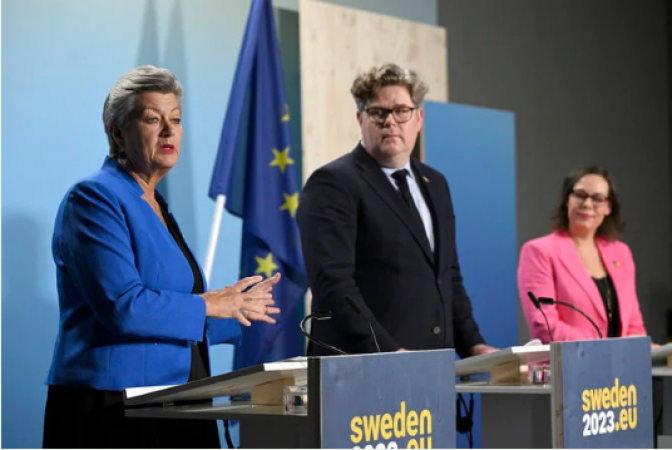
STOCKHOLM: A "consensus" from EU interior ministers was reached on Thursday to warn other countries, which refuse to take back illegal immigrants, to enter Europe from doing so, according to Sweden's migration minister. Stricter visa requirements may result.
According to Maria Malmer Stenergaard, who spoke to journalists, the ministers agreed that the tools available from 2020 will be "fully used" to increase the number of migrants returning to their countries of origin after their applications for asylum have been rejected. should be done" . Sweden, which currently holds the presidency of the European Union, chaired the Stockholm meeting.
Malmar Stenergaard said, "Member States call on the (European) Commission to return to the (European) Council, with proposals for visa restrictions should political and diplomatic efforts not yield the desired results.
Also Read; We hacked the hackers US infiltrated a major ransomware gang
Commission chief Ursula von der Leyen took a tough stance in a letter sent to EU leaders on Thursday ahead of a summit on the subject scheduled for February 9-10.
In the first half of this year, EU member states can take part in a pilot program to speed up screening and asylum procedures for eligible migrants and the "immediate return" of those who are not.
She further said she wanted the EU to compile a list of "safe countries of origin" and increase border security checks along migration routes in the Western Balkans and the Mediterranean into Europe.
According to von der Leyen, the EU intends to implement migration agreements with countries such as Bangladesh, Pakistan, Egypt, Morocco, Tunisia and Nigeria "to improve returns ... and to prevent departures".
EU Home Affairs Commissioner Ylva Johansson stressed in Stockholm that many EU countries were under "enormous pressure" as a result of the nearly one million asylum requests received in 2017.
She claimed that the EU's capacity to house nearly four million Ukrainian refugees, who fled Russia's war in their country, was further strained.
Figures from the European Commission indicate a low rate of effective return.
Also Read; UN Watchdog: Explosions near a nuclear plant in Ukraine Russia claims it's a provocation
Of the 340,500 orders to send migrants back to their countries of origin in 2021, only 21% have actually been followed. The European Union provides funding for a number of reintegration initiatives in nations that accept their citizens who were refused asylum in Europe.
These are distinct from forced returns or deportations pursuant to a court or administrative order, which often involve escorting and often do not involve assistance in the country.
Sweden wants EU countries to use visas, foreign policy and development aid to pressure other countries on the issue of returns. Sweden's government relies on the far-right Sweden Democrats to stay in power.
The Gambia, whose citizens must obtain a Schengen visa which is more cumbersome and expensive, is the only country against which the EU has so far used the visa restriction instrument.
The commission suggested in 2021 that Bangladesh and Iraq should be included in the mechanism, but nothing came of it. After a visit to Bangladesh in November, Johansson claimed that the threat of visa restrictions prompted Dhaka to change its "political openness" towards receiving illegal immigrants returning from Europe.
Since accepting more than a million asylum seekers between 2015 and 2016, most of whom were Syrians fleeing civil war in their country, Europe's attitude towards immigration has become more hostile. In 2016, an agreement was reached between the bloc and Turkey to prevent most undocumented migrants from entering Europe.
To further stem the flow of asylum seekers, Austria supports strengthening of the border fence between EU member Bulgaria and Turkey.
During a visit to that border area on Monday, Austrian Chancellor Karl Nehmer said the cost of the fence would be around two billion euros and urged the European Commission to provide funds.
The Commission has been hesitant to take that action, instead focusing on Frontex, the organization in charge of border patrols for EU member states.
The existing fence needed to be strengthened, Nehmer told reporters in Vienna on Thursday. "The commission categorically denies that there is funding for the fence. It cannot be the last word on this," he continued.
Also Read; First anti-Islamophobia advisor hired in Canada is "important step," says Prime Minister Trudeau
He insisted that the visa-free Schengen zone and the current asylum management system were ineffective. Johansson claimed she disagreed with the fence proposal because the European Council, which represents member states, had reduced her department's budget for the period 2021-2027.